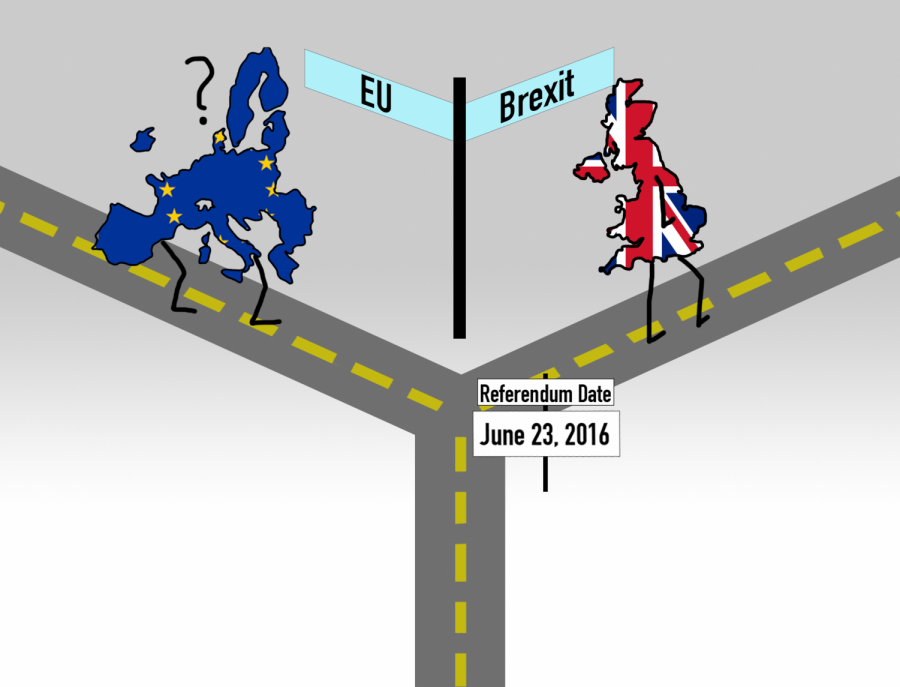Brexit negotiations continue amid Russia investigation
The United Kingdom is set to leave the European Union on March 29, 2019. The referendum occurred on June 23, 2016.
November 16, 2017
Over a year after the British population voted to secede from the European Union (EU), the government has yet to complete the scandal-riddled journey of completely going through with Brexit.
English teacher John Docherty, who previously lived in Ipswich, a town in Suffolk, United Kingdom (UK), believes that Brexit will be a mistake.
“[It] diminished the role of Great Britain in a broader, global economy,” he said. “I have relatives and friends in Europe that are all questioning, ‘what’s going to happen to us, do we still have rights to stay?’”
The UK is currently investigating the possibility of Russia having influenced the Brexit vote through social media after the alleged Russian influence in the 2016 American presidential election was brought to light.
“I don’t think it’s just a group of people who got together and said, ‘we want to get out of Europe,’” Docherty said. “I think there was another factor in play here. The Russian influence on the global scale is pretty sweeping.”
British officials are working with Facebook and Twitter in an investigation of the possible Russian involvement while also trying to tackle the larger problems that accompany the large role of social media in elections in the 21st century.
The official exit is scheduled to occur on March 29, 2019, exactly two years after British prime minister Theresa May activated Article 50 of the European Union, which describes the way in which a country should leave the union.
“The initial impact was actually in the currency, which was one of the largest single day moves in the British pound in the last 40 years,” Kris James Mitchener, an economics professor at Santa Clara University, said. “The lasting impact hasn’t been as much as people were fully predicting in part because Brexit has yet to be fully decided.”
The three main topics that must be addressed before the exit are the UK’s debts to the EU, citizens of the EU living in the UK and vice versa and trade relations between the UK and the EU.
This piece was originally published in the pages of the Winged Post on November 16, 2017.


















![“[Building nerf blasters] became this outlet of creativity for me that hasn't been matched by anything else. The process [of] making a build complete to your desire is such a painstakingly difficult process, but I've had to learn from [the skills needed from] soldering to proper painting. There's so many different options for everything, if you think about it, it exists. The best part is [that] if it doesn't exist, you can build it yourself," Ishaan Parate said.](https://harkeraquila.com/wp-content/uploads/2022/08/DSC_8149-900x604.jpg)




![“When I came into high school, I was ready to be a follower. But DECA was a game changer for me. It helped me overcome my fear of public speaking, and it's played such a major role in who I've become today. To be able to successfully lead a chapter of 150 students, an officer team and be one of the upperclassmen I once really admired is something I'm [really] proud of,” Anvitha Tummala ('21) said.](https://harkeraquila.com/wp-content/uploads/2021/07/Screen-Shot-2021-07-25-at-9.50.05-AM-900x594.png)







![“I think getting up in the morning and having a sense of purpose [is exciting]. I think without a certain amount of drive, life is kind of obsolete and mundane, and I think having that every single day is what makes each day unique and kind of makes life exciting,” Neymika Jain (12) said.](https://harkeraquila.com/wp-content/uploads/2017/06/Screen-Shot-2017-06-03-at-4.54.16-PM.png)








![“My slogan is ‘slow feet, don’t eat, and I’m hungry.’ You need to run fast to get where you are–you aren't going to get those championships if you aren't fast,” Angel Cervantes (12) said. “I want to do well in school on my tests and in track and win championships for my team. I live by that, [and] I can do that anywhere: in the classroom or on the field.”](https://harkeraquila.com/wp-content/uploads/2018/06/DSC5146-900x601.jpg)
![“[Volleyball has] taught me how to fall correctly, and another thing it taught is that you don’t have to be the best at something to be good at it. If you just hit the ball in a smart way, then it still scores points and you’re good at it. You could be a background player and still make a much bigger impact on the team than you would think,” Anya Gert (’20) said.](https://harkeraquila.com/wp-content/uploads/2020/06/AnnaGert_JinTuan_HoHPhotoEdited-600x900.jpeg)

![“I'm not nearly there yet, but [my confidence has] definitely been getting better since I was pretty shy and timid coming into Harker my freshman year. I know that there's a lot of people that are really confident in what they do, and I really admire them. Everyone's so driven and that has really pushed me to kind of try to find my own place in high school and be more confident,” Alyssa Huang (’20) said.](https://harkeraquila.com/wp-content/uploads/2020/06/AlyssaHuang_EmilyChen_HoHPhoto-900x749.jpeg)












